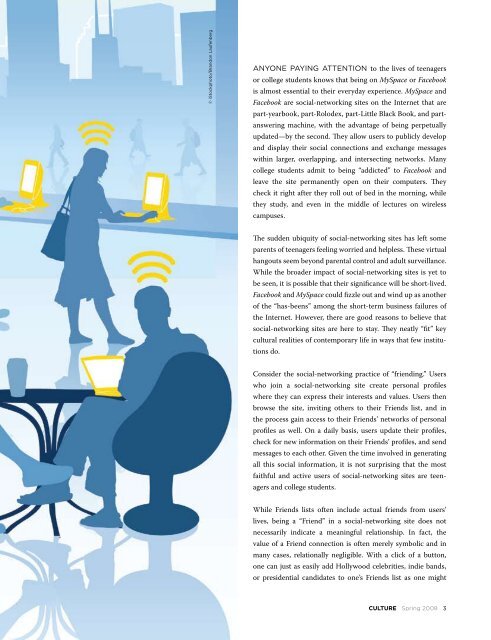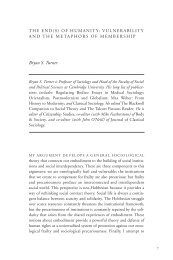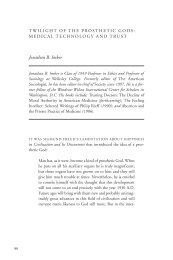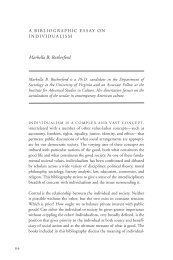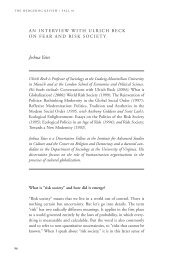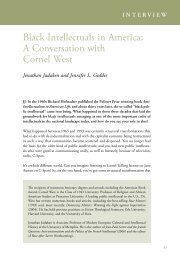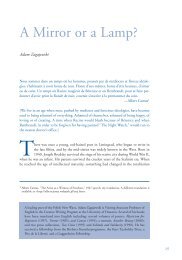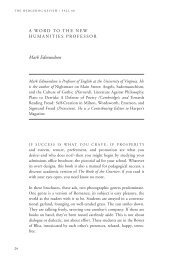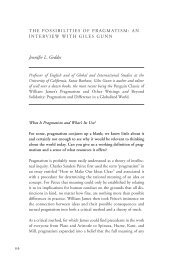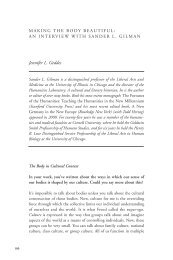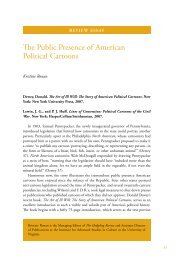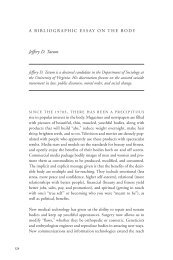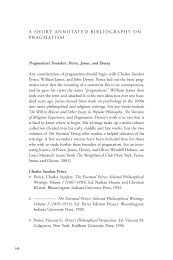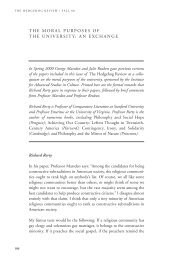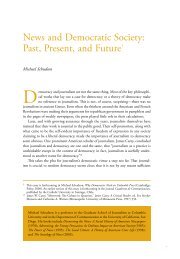ambiguous distinctions - Institute for Advanced Studies in Culture
ambiguous distinctions - Institute for Advanced Studies in Culture
ambiguous distinctions - Institute for Advanced Studies in Culture
You also want an ePaper? Increase the reach of your titles
YUMPU automatically turns print PDFs into web optimized ePapers that Google loves.
to the lives of teenagers<br />
or college students knows that be<strong>in</strong>g on MySpace or Facebook<br />
is almost essential to their everyday experience. MySpace and<br />
Facebook are social-network<strong>in</strong>g sites on the Internet that are<br />
part-yearbook, part-Rolodex, part-Little Black Book, and partanswer<strong>in</strong>g<br />
mach<strong>in</strong>e, with the advantage of be<strong>in</strong>g perpetually<br />
updated—by the second. They allow users to publicly develop<br />
and display their social connections and exchange messages<br />
with<strong>in</strong> larger, overlapp<strong>in</strong>g, and <strong>in</strong>tersect<strong>in</strong>g networks. Many<br />
college students admit to be<strong>in</strong>g “addicted” to Facebook and<br />
leave the site permanently open on their computers. They<br />
check it right after they roll out of bed <strong>in</strong> the morn<strong>in</strong>g, while<br />
they study, and even <strong>in</strong> the middle of lectures on wireless<br />
campuses.<br />
The sudden ubiquity of social-network<strong>in</strong>g sites has left some<br />
parents of teenagers feel<strong>in</strong>g worried and helpless. These virtual<br />
hangouts seem beyond parental control and adult surveillance.<br />
While the broader impact of social-network<strong>in</strong>g sites is yet to<br />
be seen, it is possible that their significance will be short-lived.<br />
Facebook and MySpace could fizzle out and w<strong>in</strong>d up as another<br />
of the “has-beens” among the short-term bus<strong>in</strong>ess failures of<br />
the Internet. However, there are good reasons to believe that<br />
social-network<strong>in</strong>g sites are here to stay. They neatly “fit” key<br />
cultural realities of contemporary life <strong>in</strong> ways that few <strong>in</strong>stitutions<br />
do.<br />
Consider the social-network<strong>in</strong>g practice of “friend<strong>in</strong>g.” Users<br />
who jo<strong>in</strong> a social-network<strong>in</strong>g site create personal profiles<br />
where they can express their <strong>in</strong>terests and values. Users then<br />
browse the site, <strong>in</strong>vit<strong>in</strong>g others to their Friends list, and <strong>in</strong><br />
the process ga<strong>in</strong> access to their Friends’ networks of personal<br />
profiles as well. On a daily basis, users update their profiles,<br />
check <strong>for</strong> new <strong>in</strong><strong>for</strong>mation on their Friends’ profiles, and send<br />
messages to each other. Given the time <strong>in</strong>volved <strong>in</strong> generat<strong>in</strong>g<br />
all this social <strong>in</strong><strong>for</strong>mation, it is not surpris<strong>in</strong>g that the most<br />
faithful and active users of social-network<strong>in</strong>g sites are teenagers<br />
and college students.<br />
While Friends lists often <strong>in</strong>clude actual friends from users’<br />
lives, be<strong>in</strong>g a “Friend” <strong>in</strong> a social-network<strong>in</strong>g site does not<br />
necessarily <strong>in</strong>dicate a mean<strong>in</strong>gful relationship. In fact, the<br />
value of a Friend connection is often merely symbolic and <strong>in</strong><br />
many cases, relationally negligible. With a click of a button,<br />
one can just as easily add Hollywood celebrities, <strong>in</strong>die bands,<br />
or presidential candidates to one’s Friends list as one might


